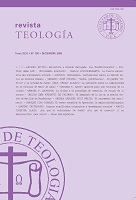Reflexiones sobre el método moral en Persona Humana
Keywords:
Sexuality, Virtue, Proportionality, Marriage, Premarital relationsAbstract
Following Gaudium et spes (51.3), the declaration Persona humana reaffirms that the
moral goodness of sexual acts “must be determined by objective standards … based
on the nature of the human person and his acts”. This is not an expression of naturalistic objectivism, but rather comes from the respect of “true human dignity” and the preservation of the authentic meaning of sexuality. These statements must be understood within the framework of virtue ethics, according to which practical reason discovers the due human goods, the virtuous ends, in natural inclinations. Therefore, it is possible to sustain the existence of behaviours that contradict those ends by their very object, even if this object cannot be defined in its genus moris without its proper context. Applying these principles to sexuality, it must be said that its correct expression has an intrinsic and necessary reference to marriage, recognizing at the same time that there is a certain tension between the order of chastity and the order of positive law. These reflections show that it is precisely in order to be consistent with the doctrine of virtue and moral absolutes that Moral Theology must avoid the temptation of deductivism, and must work in order to refine typologies and consider concrete cases more closely. Thus, it will be better able to face the challenges of a social context in constant evolution and change. With this article the author sheds more light in what he stated in two previous articles, “Premarital sex in “limit-situations’? “, Teología 83 (2004), and “The teleologism after Veritatis Splendor,” Moralia 97
(2003).
Downloads
Downloads
Published
How to Cite
Issue
Section
License
Copyright (c) 2020 Teología

This work is licensed under a Creative Commons Attribution-NonCommercial-ShareAlike 4.0 International License.














 Teología
Teología